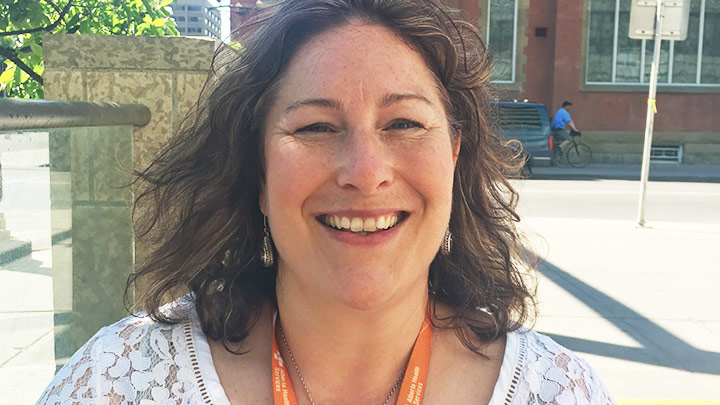
May 31, 2017

President’s Excellence Award winner and social worker Laura Devereaux works to help psychosocially disadvantaged patients who are marginalized in society, and who also face complex health issues that hinder their ability to access, navigate and cope with both the health care system and the demands of their diagnosis.
Story by Sean Woods
For more than 20 years, Laura Devereaux has tirelessly advocated for vulnerable patients as a social worker in the healthcare system.
Laura works to help psychosocially disadvantaged patients who are marginalized in society, and who also face complex health issues that hinder their ability to access, navigate and cope with both the health care system and the demands of their diagnosis. These issues can include addiction and mental health concerns, medical illness and psychological trauma.
“There’s a misconception that complex and vulnerable patients are somehow different,” says Devereaux, who has worked at the Sheldon M. Chumir Health Centre (UCC) since 2008. “But, same as everyone else, they too need respect, compassion and validation.
“The challenge is that their heightened health complexity and heavy psychosocial needs cannot be easily understood or met without a collaborative response. We see patients who have exhausted their options. Feelings of hopelessness and demoralization become entrenched — and this makes finding solutions more difficult”.
Devereaux and her team looked at ways to address this challenge — and created the Complex Integrated Care Plan (CICP) project — which has earned her the President’s Excellence Award for Patient and Family Centred Care.
With a unified focus, the project works with the patient to pull together their unique team of providers and community supports to meet their needs in a coordinated way.
CICP is partnered with the EMS Coordinated Care Program and Calgary Urban Project Society Connect 2 Care team. They all work together to design “live” electronic patient-care plans for the patient — plans that inform holistic patient treatment recommendations and management of both psychological and physical conditions.
“We have a very specific goal — to build relationships between care providers, facilities and community partners, which results in better health outcomes for our patients,” says Devereaux. “Our staff and partners look for solutions. They see the person, not the symptoms.”
Once a plan has been created, it’s stored electronically in the Sunrise Clinical Manager system, which can be accessed by any healthcare provider in Calgary who uses the system. This ensures timely communication and coordination between care providers; the patient’s care history is kept as up to date as possible.
“This has huge benefits,” adds Devereaux. “For example, if a CICP patient makes a call to 911, the paramedics will know exactly what that patient’s particular needs are — and are guided with specific intervention recommendations. This plan carries them to the door of the hospital where the handover occurs — and the CICP plan is flagged and available to the ED/UCC team. Just as importantly, the patient doesn’t have to share their story again — resulting in re-traumatization for some.”
At present, Devereaux and her colleagues have identified more than 100 patients identified who would benefit from CICP. There are 14 activated patients and 17 patients pending activation in the program, and its benefits are becoming clear.
As an example, one patient experienced a 59-per-cent reduction in ER/UCC visits, and a 52-per-cent reduction in use of EMS services in less than a year.
Overall, there has been a reduction in non-medically necessary interventions as well as reductions in duplicate diagnostics, assessments and inpatient admissions. Patients have benefited from diagnostic clarification and improved access to services. Also worth noting, reports of reduced provider fatigue and bioethical distress have been shared.
“It’s about getting the right treatment by the right people,” says Devereaux. “We always strive to achieve seamless care for the patient. We rely on the relationships we have with champion providers and community partners who believe in this work and, more importantly, have hope for the patient”.
Devereaux’s passion and dedication have earned praise from many, including her community partners.
“Laura’s work is a prime example of how acute care, urgent care and the community should be working together,” says Dr. Van Nguyen, health director, Calgary Urban Project Society. “She makes dedicated and passionate efforts to reach out, keep partners informed, and always asks for feedback.
“Laura is kind, compassionate and, above all, she listens and helps patients feel valued.”
Regarding her President’s Excellence Award, Devereaux is quick to give credit to her colleagues.
“I could not have done this work without the leadership of my manager Heather Manning and the commitment of my team in Urgent Care, Connect 2 Care, EMS Coordinated Care Program and the many community and AHS providers who support this work and contribute to the care plans.
“We’re so happy to receive this award. We are proud to be among other nominees and award recipients who strive to emulate the values of AHS and work toward creating compassionate and life changing opportunities for those we serve.
The President’s Excellence Awards recognize and celebrate the dedication and accomplishments of AHS staff, physicians and teams. Award recipients demonstrate exceptional collaboration, innovation and a commitment to quality improvement and patient care.